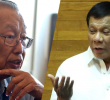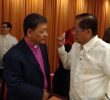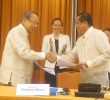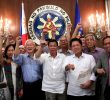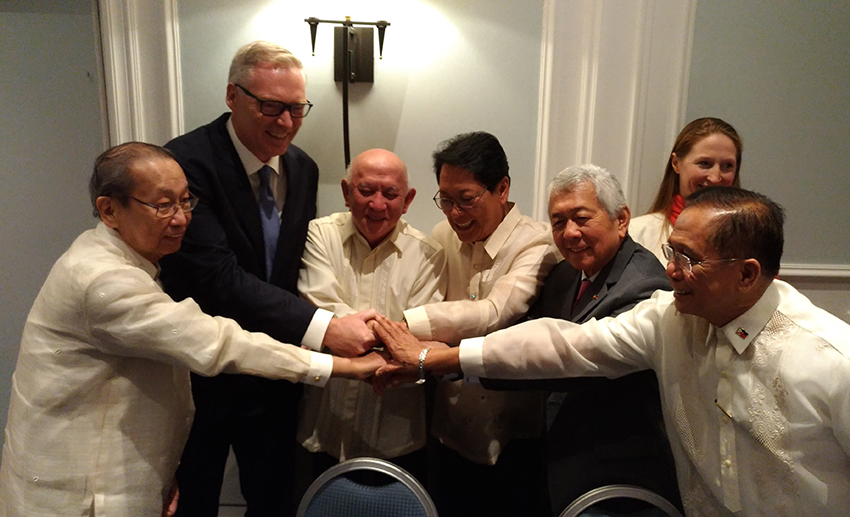 ROME, Italy — Optimistic and looking forward to a more fruitful deal, peace negotiators from both Philippine government and the communists met after more than three months during the opening of the third round of peace negotiations here on Thursday at 10:00 am.
ROME, Italy — Optimistic and looking forward to a more fruitful deal, peace negotiators from both Philippine government and the communists met after more than three months during the opening of the third round of peace negotiations here on Thursday at 10:00 am.
When the 2nd round of peace talks concluded on October 9 last year, peace panels of the Government of the Republic of the Philippines (GRP) and the National Democratic Front of the Philippines (NDFP), approved a common framework and outline on social, economic and political reforms and a commitment to grant amnesty to more than 400 political detainees.
This time around, the NDFP wants to see more substance in the talks while the GRP aims to further prevent any resumption or escalation of armed conflict in the country.
At the opening ceremonies, CPP founder and NDFP Chief Political Consultant Jose Maria Sison said he is optimistic that the negotiating panels “can talk in a non-adversarial way and overcome any obstacles by addressing the roots of the armed conflict.”
Sison said there is a need to satisfy the demands of the people for basic social, economic and political reforms. This, he said, will lay down the foundation for a “just and lasting peace and build a Philippines that is truly independent, democratic, just, prosperous and progressive.”
For his part, GRP chief negotiator Silvestre Bello said, “I am one with President Duterte’s optimism that in this round-of-talks, we are able to finalize and approve the joint ceasefire agreement.”
A joint bilateral ceasefire agreement would further extend and expand the unilateral ceasefire order for the AFP and the New People’s Army. The NDFP has maintained that the AFP continues to violate the ceasefire order with the continued operation of its troops in schools and community centers in hinterland villages.
Upbeat, cheers
More than a hundred Filipinos filled a room at the Holiday Inn Hotel here for a historic gathering. It was the third round of the peace talks between the Philippine government and the NDFP, the political wing of the CPP that has been waging Asia’s strongest and long running armed rebellion.
Like old-time friends catching up, the crowd of mostly government officials and NDFP members and resource persons mostly in their Filipiniana attire were upbeat as the opening of the third round of talks began.
Members of the overseas Filipino workers in Italy were also present along with their families.
While GRP chief negotiator Silvestre Bello III was delivering his opening speech, he introduced the 10-member delegation from the House of Representatives and the government peace consultants.
He described Bayan Muna Partylist Rep. Carlos Isagani Zarate as having “identity crisis” and also quipped on the participation of National Anti-Poverty Chair Liza Maza. The two are among the government’s 77-men delegation while the NDF has 58.
Before her appointment as the NAPC Chair by President Rodrigo Duterte, Maza served as a former partylist for the militant Gabriela Women’s Party. Zarate is now a vice chairperson of the House of Congress’ Committee on Peace, Reconciliation and Unity.
Foreign Secretary Perfecto Yasay said he was elated to meet with Prof. Sison.
Yasay met with Italy’s Foreign Minister on Wednesday prior to attending the opening ceremonies.
“My trip has brought about the fulfillment of two of the top of my bucket list, one is to be able to meet Joma Sison. It’s more than enough for me, justifying my trip to be here,” he said.
Lasting peace not easy
At around 10:00 am (5:00 pm Philippine time), the opening ceremonies started with the opening statements of the facilitators from the Royal Norwegian Government, Ambassador Erik Førner and Special Envoy to the Peace Process Elisabeth Slattum.
“It’s truly great to see you at the negotiation table again for the third time in only a few months. To overcome differences and to make lasting peace is not easy,” Førner said.
He said both parties showed commitment to move forward with the negotiations, which formally resumed after an impasse of five years in August last year.
Førner stressed the need for a dialogue and negotiations to achieve solutions to the conflict. He said there are many differences that the parties need to overcome within the next few days.
Release political prisoners
NDF’s Sison said the government’s compliance with the Comprehensive Agreement on the Respect for Human Rights and International Humanitarian Law through the release of the 392 political prisoners would help achieve a “more stable bilateral ceasefire.”
During the Presidential elections last year, Duterte offered to grant amnesty and pardon to political prisoners, a promise that is seen as one of the factors that catapulted the accelerated resumption of the peace process.
Six months later, President Duterte backtracked, saying political prisoners are his “last card.”
“They are asking for 130 detainees to be released, all NPAs (New People’s Army), sorry. I cannot do that. I cannot do it, because uubusin nila ang baraha ko,” Duterte told reporters back in December last year.
Serious issues
NDFP chief negotiator Fidel Agcaoili said there is a need to prove that the negotiations will indeed bring about genuine change.
“I reiterate the determination of our panel to do everything necessary to make these negotiations a success,” he said.
The NDFP said it is “seriously concerned” with the violations of the CARHRIHL and the unilateral ceasefire arising from the government’s anti-insurgency campaign Oplan Bayanihan and the new security plan, Oplan Kapayapaan.
The killings related to the anti-drugs campaign Oplan Tokhang and Double Barrel under the Duterte government were also seen by the NDFP as an issue of violating the CARHRIHL, the first substantive agenda signed between the government and the NDFP.
‘If one falls, both fall’
Elisabeth Slattum, special envoy of the Royal Norwegian Government said while unresolved issues remain for both panels to agree to, the RNG is commending the parties for working together.
“We commend the parties for doing exactly that, working together, despite disagreements, frustrations and outside pressure, showing courage, striving for progress on the substantive agenda items, with special focus on Caser this round,” she said.
Slattum described the drafts of both parties as “ambitious.”
“And both want a better future for the Philippines and for their fellow Filipinos,” she said.
“The first agreement signed between the parties, the JHD in 1992, states that the common goal of the peace negotiations shall be the attainment of a just and lasting peace. I want to stress the word common. The parties’ feet are tied – if one falls, both fall,” Slattum said.
She said the peace negotiations should be seen as a “joint problem-solving, working together toward a common goal.”
“If the peace talks fall apart, both lose, everybody loses,” she said. (davaotoday.com)

